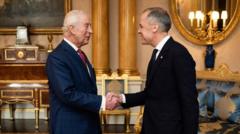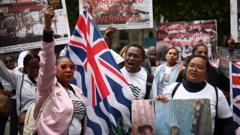The Canadian province of Quebec plans to impose restrictions on public prayer and limit the exclusive offering of religion-based menus, like kosher and halal meals, in public institutions as part of its latest effort to strengthen state secularism.
The 'secularism 2.0' changes are part of a new bill introduced by the governing Coalition Avenir Quebec on Thursday, which expands a 2019 religious symbols law that has fueled fierce debate throughout the country.
The original law prevents judges, police officers, teachers, and public servants from wearing symbols such as the kippah, turban, or hijab while at work. Canada's Supreme Court will hear a legal challenge of that law early next year.
Jean-François Roberge, the minister responsible for secularism, said in French at a news conference on Thursday that the bill was 'part of an approach that respected individual as well as collective rights'.
The measures proposed in Bill 9 would extend the ban on wearing religious symbols to staff in subsidised daycares, bar 'collective religious practices' like prayer in public spaces without prior authorisation, and prevent face coverings in daycare and at educational institutions from daycare through post-secondary education.
Roberge cited recent protests involving prayer at pro-Palestinian demonstrations as a catalyst for limiting public prayer, stating, 'It's shocking to see people blocking traffic, taking possession of the public space without a permit.'
However, the legality of these measures has faced backlash from the opposition Parti Québécois, which accuses the CAQ of sowing division ahead of next year's elections. The National Council of Canadian Muslims has also criticized the bill as a regressive move that exacerbates identity politics.
In recent years, the discussion regarding secularism has remained contentious in Quebec, where previously instituted laws have resulted in the suspension of several teachers for their alleged promotion of 'Islamist' beliefs, sparking further debate. Reports from government committees continue to recommend extending the scope of prohibition against religious symbols in various public service contexts.
Similar secular laws are present in several European nations, with France passing restrictions on religious symbols in schools and public spaces in previous years, reflecting a broader global conversation surrounding the separation of religion and state.




















